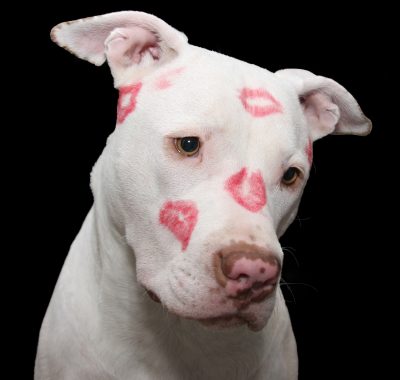If you were discriminated against, feared or had your fate decided by others based on nothing more than how you look, wouldn’t you want someone to stand up for you? I know I would. That’s why it’s so disheartening to animal lovers and animal rescue organizations like the Nova Scotia SPCA that breed-specific bans – or, more accurately, breed-discriminatory bans – still exist.
I strongly believe that each and every animal, like each and every human being, is individual and unique….that they deserve the same chance to show the world who they are on the inside…….that they should be judged not by their appearance, but by their behavior.

Regardless of whether you love, hate or feel completely indifferent to larger breeds like pit bulls or rottweilers, I’d like you to think about your own dog, whatever breed they may be. Consider how much you love your dog and how much they love you. I’m sure you’ll agree that your dog is distinctly unique in personality, spirit and behavior. I’m sure you’ll also see an animal who is deserving of a happy life. Now consider if somebody else, who has never even met your dog, tries to threaten their future. That’s what breed-specific bans look like.
Don’t take my word for it….take a look at the hard evidence and expert opinions against breed-specific legislation from: the American Veterinary Medical Association, the American Veterinary Society of Animal Behavior, the Centers for Disease Control and Prevention, the American Society for the Prevention of Cruelty to Animals, the National Canine Research Council and the Certification Council for Professional Dog Trainers.
- BSL has not achieved its main purpose – to keep people safe from dog bites. Experts agree that there is no credible evidence that breed-specific bans reduce the number or severity of dog bites. In fact, many jurisdictions that initially implemented BSL have since rescinded those bans.
- BSL relies on arbitrary breed labels and generalized descriptions. The majority of North America’s 98 million dogs are mixed breeds, thereby defying lineage classification. The Centers for Disease Control and Prevention examined 20 years of data on dog bites and concluded that it is virtually impossible to calculate bite rates for specific breeds. They recommend against using breed as a factor in dog-bite prevention policy, stating ‘Any dog of any breed has the potential to bite’.

- BSL misplaces blame and punishes the innocent. BSL calls for the culling of all dogs of certain arbitrary breeds, regardless of whether they have ever bitten anyone. It thus discriminates against and victimizes responsible dog owners and their innocent pets. BSL does not make irresponsible dog owners liable for their dog’s actions, yet a 16-year study by the National Canine Research Council found that:
- 85% of fatal dog attacks involved dogs who were not spayed/neutered
- 76% of dogs who attacked were ‘backyard dogs’ who had little or no positive social interaction with people or other animals
- 59% of the dogs who attacked had been mistreated, neglected and/or abused
- BSL is costly to enforce. Experts agree that BSL is essentially a waste of public resources that could be better spent elsewhere. The devastated families who loved them pay a much higher price.
- BSL makes erroneous assumptions about pit bulls’ temperament. The American Temperament Testing Society, an independent research group that has published studies since 1977, reports that American Pit Bull Terriers and American Staffordshire Terriers pass temperament tests at a rate of 87% and 86% respectively. These rates are similar or superior to those of Golden Retrievers (86%), Jack Russell Terriers (85%), Border Collies (82%), Beagles (80%), Miniature Poodles (77%) and Lhasa Apsos (70%).
- It’s not just pit bulls. Across the U.S. for example, over 75 different breeds (and mixes of those breeds) are currently on a list of banned or restricted dogs. In some cities/counties, German Shepherds, Rottweilers, Dobermans, Labrador Retrievers and Golden Retrievers are deemed ‘dangerous’ and are therefore banned. If you think small dogs are excluded, think again. Even breeds like Pugs and French Bulldogs are on the list in some places!

If BSL doesn’t work, how to we make real and lasting change in keeping people and dogs safe? Experts agree that the solutions aren’t simple and take work, but our focus must be on:
- regulatory and legal penalties for dog owners that hold them accountable for the humane care and control of their dog, regardless of breed or type
- education of dog owners about responsible pet ownership – spaying/neutering, socialization, training and pet care
- education of parents and children regarding safety around dogs
- education of the general public to change misperceptions and stereotypes of misunderstood dogs
Currently, the dogs most often subject to bans are those breeds labeled ‘pit bulls’. Yet prejudice against these dogs is based on assumptions and a misunderstanding of their temperament. Many dogs that would fall into the category of banned breeds are wonderful, loving family pets. They are equally deserving, equally amazing and equally loving when compared to any other dog. We need to spread the word about how incredible these loyal beautiful breeds truly are, remove barriers to their happiness and that of their loving families, and put a stop to breed bias.
